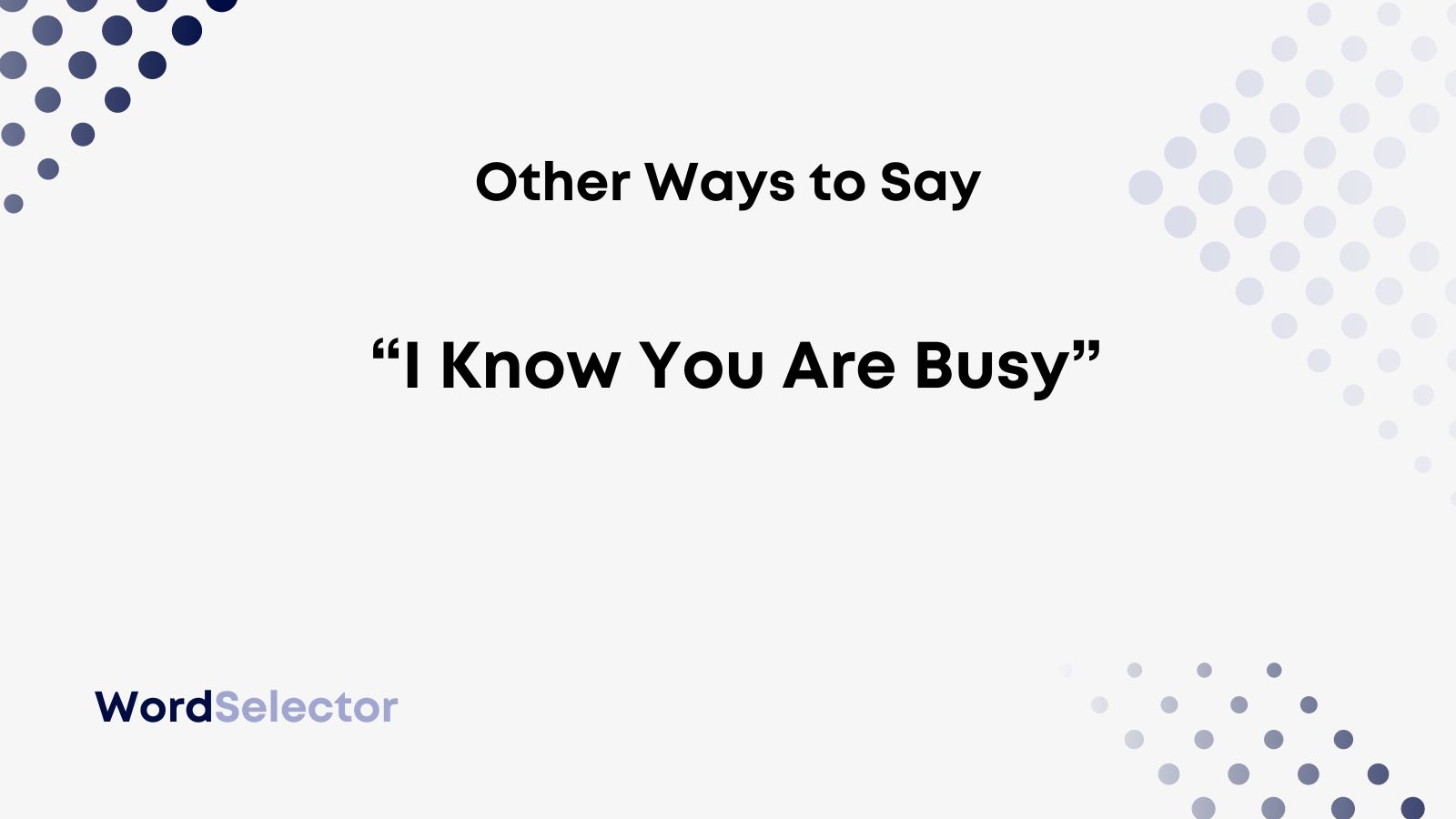Sometimes, you’ll need someone’s attention in an email. But it’s likely that they’re quite busy and may not be ready to help you.
You can say “I know you are busy” in these cases. But it’s not the only phrase that works well.
This article has gathered some alternatives showing you how to say “I know you are busy” professionally and politely.
Other Ways to Say “I Know You Are Busy”
- Is now a good time?
- I hope you don’t have too much on your plate
- I appreciate you are busy
- I’m aware that now might not be a good time
- I understand that you are busy
- I’m sure you’re swamped with work
- I hope you’re not too tied up
- I’m mindful of your busy schedule
- I realize you have a hectic schedule
- I know you’re juggling multiple responsibilities.
KEY TAKEAWAYS
- “I know you are busy” is a respectful and polite way to show that you appreciate someone’s busy schedule.
- “Is now a good time?” is a great formal question to help mix things up in your writing.
- Try “I hope you don’t have too much on your plate” as a conversational alternative in emails.
You should read on to learn more about the best formal and informal options from the list above. We’ll help you understand how to say “I know you are busy” in an email.
Alternatively, you can skip to the final section. We’ve explained whether “I know you are busy” is correct and acceptable in formal emails.
Is Now a Good Time? (Formal)
If you’re wondering how to email someone who is busy, why not try a question? Questions are a good way to break the ice in formal emails, so it’s worth giving one a go.
In this case, try “is now a good time?”
It’s an excellent formal choice showing you how to say “I know you are busy” politely. We recommend using it when asking your boss to reply.
For instance, you could have emailed your boss a few days ago. They might be quite busy, so they could have missed your email or forgot to respond.
If you think your email was important, you should call them up on it. Let them know that you still expect a response, but do so in a polite way.
That’s where “is now a good time?” comes in. It’s a respectful way to show that you appreciate someone’s busy schedule. It encourages them to reply without demanding it directly.
This email example should clear things up if you still need help:
Dear Mr. Jackson,
Is now a good time? I appreciate that you’re quite busy, but I notice you haven’t replied to my previous email.
Thank you so much,
Darryl Harding
I Hope You Don’t Have Too Much on Your Plate (Informal)
For a more informal option, you can use “I hope you don’t have too much on your plate.” It’s another way to say “I know you are busy” that sounds more friendly and respectful.
The informal part of this phrase comes from “too much on your plate.” It shows you hope someone isn’t too busy to help you with something.
We recommend using it when emailing coworkers. It shows you could use their help, but you don’t want to take them away from their other work.
Also, using “I hope” rather than asking for help makes you sound more personal and respectful. It shows you care about the recipient and hope they’re free enough to assist you without interfering with their day.
You should also review this sample email:
Hi Emily,
I hope you don’t have too much on your plate because I need your help completing this project, if that’s okay.
All the best,
Rebecca Sellinge
Is It Correct to Say “I Know You Are Busy”?
It is correct to say “I know you are busy.” It’s actually a really useful phrase to include in a formal email. After all, it shows you respect someone’s busy schedule.
Generally, it works when emailing your boss. It shows you appreciate how busy they are, but you would still like them to reply.
There are typically two main reasons for using a phrase like this. For instance:
- Someone hasn’t replied to your previous email
- You want to ask for help
These tend to be the most common reasons for “I know you are busy” to appear. If they apply to you, feel free to include the phrase to show you care about someone’s schedule.
Alternatively, you can use the following extensions:
- I know you are busy, but I would appreciate
- I know you are very busy, but I would appreciate hearing from you
- I know you are busy with your work
- I know you are probably busy
- I know you are extremely busy
- Sorry to bother you. I know you are busy
These extensions help you to create more direct scenarios when emailing someone. You can make it relate to your situation to show that you’re interested in hearing from the recipient.

